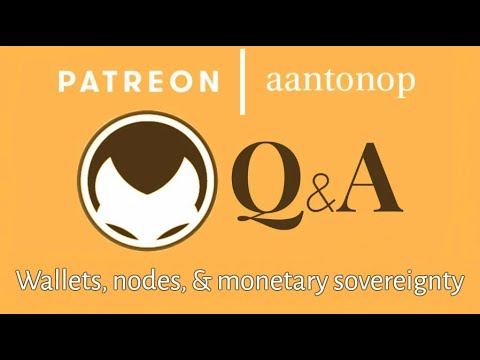Should you run a full node with a hardware wallet like Trezor? What are the main factors to monetary sovereignty? Self-validation of the consensus rules and controlling your own keys. What are the issues with using a custodial wallet or a block explorer? What is BIP-174?
More about Electrum wallet: https://electrum.org/#home
More on Electrum Personal Server: https://github.com/chris-belcher/electrum-personal-server
More on Trace Mayer’s monetary sovereignty initiative: https://www.proofofkeys.com/
More on BIP-174: https://github.com/bitcoin/bips/blob/master/bip-0174.mediawiki
CORRECTION: At 3:59, I mistakenly named “Bitblocks” as a hardware wallet. It is not a hardware wallet. I meant to say “BitBox.”
This question is from the December monthly subscriber session, which took place on December 15th 2018. If you want early-access to talks and a chance to participate in the monthly live Q&As with Andreas, become a patron: https://www.patreon.com/aantonop
RELATED:
How do I choose a wallet? – https://youtu.be/tN6b62sEpsY
Secure, tiered storage system – https://youtu.be/uYIVuZgN95M
Hardware wallets and attack surface – https://youtu.be/8mpDcBfNA7g
Setting up secure storage devices – https://youtu.be/wZ9LxLLvfXc
What is a private key? – https://youtu.be/xxfUpIV9wRI
How do mneomonic seeds work? – https://youtu.be/wWCIQFNf_8g
Using paper wallets – https://youtu.be/cKehFazo8Pw
Wallet design and mass adoption – https://youtu.be/WbZX6BDZJHc
Cryptographic primitives – https://youtu.be/RIckQ6RBt5E
Public keys vs. addresses – https://youtu.be/8es3qQWkEiU
Re-using addresses – https://youtu.be/4A3urPFkx8g
Passphrases and seed storage – https://youtu.be/jP7pEgBpaO0
Coin selection and privacy – https://youtu.be/3Ck683CQGAQ
Multi-signature and distributed storage – https://youtu.be/cAP2u6w_1-k
Nonces, mining, and quantum computing – https://youtu.be/d4xXJh677J0
Is quantum computing a threat? – https://youtu.be/wlzJyp3Qm7s
Spam transactions and Child Pays For Parent – https://youtu.be/t3c0E4fkSNs
Orphan blocks and stuck transactions – https://youtu.be/MsdW0CTYwyY
Miners, pools, and consensus – https://youtu.be/JHz7LM4ncLw
Software distribution security – https://youtu.be/_V0vqy046YM
Protocol development security – https://youtu.be/4fsL5XWsTJ4
Geopolitics and state-sponsored attacks – https://youtu.be/htxPRTJLK-k
Sanctions and censorship resistance – https://youtu.be/DeXe5eGRl7E
How to get people to care about security – https://youtu.be/Ji1lS9NMz1E
Honest nodes and consensus – https://youtu.be/KAhY2ymI-tg
Why running a node is important – https://youtu.be/oX0Yrv-6jVs
Andreas M. Antonopoulos is a technologist and serial entrepreneur who has become one of the most well-known and respected figures in bitcoin.
Follow on Twitter: @aantonop https://twitter.com/aantonop
Website: https://antonopoulos.com/
He is the author of two books: “Mastering Bitcoin,” published by O’Reilly Media and considered the best technical guide to bitcoin; “The Internet of Money,” a book about why bitcoin matters.
Subscribe to the channel to learn more about Bitcoin & open blockchains; click on the red bell to enable notifications about new videos!
MASTERING BITCOIN, 2nd Edition: https://amzn.to/2xcdsY9
Translations of MASTERING BITCOIN: https://bitcoinbook.info/translations-of-mastering-bitcoin/
THE INTERNET OF MONEY, v1: https://amzn.to/2ykmXFs
THE INTERNET OF MONEY, v2: https://amzn.to/2IIG5BJ
Translations of THE INTERNET OF MONEY:
Spanish, ‘Internet del Dinero’ (v1) – https://amzn.to/2yoaTTq
French, ‘L’internet de l’argent’ (v1) – https://www.amazon.fr/Linternet-largent-Andreas-M-Antonopoulos/dp/2856083390
Russian, ‘Интернет денег’ (v1) – https://www.olbuss.ru/catalog/ekonomika-i-biznes/korporativnye-finansy-bankovskoe-delo/internet-deneg
Vietnamese, ‘Internet Của Tiền Tệ’ (v1) – https://alphabooks.vn/khi-tien-len-mang
MASTERING ETHEREUM (Q4): https://amzn.to/2xdxmlK
Music: “Unbounded” by Orfan (https://www.facebook.com/Orfan/)
Outro Graphics: Phneep (http://www.phneep.com/)
Outro Art: Rock Barcellos (http://www.rockincomics.com.br/)
source











Why would someone dedicate a computer, electricity and bandwidth to run a node and don't get paid? In bitcoin only miners are supposed to run nodes and they get paid.
Samourai wallet allows you link wallet to your node, but not to a Casa node because you need to edit files which you cant get at on Casa at the moment.
Another solution you can do is to use the software provided by Trezor, but import the read-only BIP32 keys to Bitcoin Core, and check that you really recieved the money (for sending there's no need for checking, as it doesn't require full trust).
Thank you for the video
I learn a lot from you AA. Thanks again.
THANKS GENIOUS!
I'm running a full node, but NOT using it for transactions, for the simple reason, that if I get hacked, and they somehow get my entire D:BTCCore folder, I've lost my Bitcoin. Haven't I?
Using a Trezor, even if they break in and steal it, they still can't get they keys. I'm using both password and pass-phrases.
I really wish the Core team would support hardware wallets directly. Obviously, I have no idea what it takes to do that. Maybe their time is just better spent elsewhere. But it would be the optimal solution, wouldn't it? Owning your keys, validating your own transactions. Will look into Electrum.
Regarding nodes, what is your opnion about Vite's node ?
Thank you Andreas, one of the best vidoes !
Best video on the Internet.
It would be great if you did a video discussing the merits of BCHSV and possible drawbacks from a technological perspective and how it compares to BTC.
Smashed the like
Use "Sign without sending" option on Trezor. Then copy transaction signature and broadcast it from your node using "sendrawtransaction"
So after all btc is mined, how will transactions be confirmed without miners. Will btc be less secure?
When will Bitcoin evolve? Can it really though? Or are Alt coins the real future for this space?
multi camera skills lol
How do I set up a node to run bitcoin? I thought it was a pow coin
Thanks Andreas!